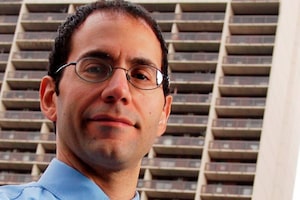In today's Globe & Mail, Shirley Won has an article on portfolio manager Noah Blackstein. While yours truly is quoted in this piece, I mention it here because the article touches on a topic that I've been mulling for some time.
Historical value-added
In the article I commended Blackstein for his excess returns (above his benchmarks) over his tenure, which includes two bear markets. I also made note of Blackstein's high turnover. But I'd like to add some context to both items and propose that there may be a link.
Blackstein began managing money for Dynamic funds in 1998. (Sidenote: I met him more than a year earlier when he was an analyst at BPI Funds. But now I'm aging myself.) He began managing Dynamic Power American Growth in 1998. Three years later he became lead manager of Dynamic Power Global Growth Class.
In both cases he has posted returns just north of 6 per cent annually since each fund's respective inception date. Since Blackstein's 1998 start in Power American Growth, U.S. stocks (in Canadian dollars) have been flat. Global stocks, also in Canadian dollars, have also been about flat (-0.2 per cent per year) since the fund's 2001 birth. So he has generated excess returns of about 6 per cent annually on his Dynamic funds.
The magnitude of his outperformance is more impressive when you consider that his funds' returns (as with all mutual funds) are reported net of each fund's management expense ratio (MER) and brokerage costs incurred on stock trades. The funds' MERs, which range from 2.35 per cent to 2.45 per cent, were higher in previous years.
And given Blackstein's heavy-trading style - turnover has averaged north of 300 per cent annually in recent years - the funds have racked up a significant amount of trading costs (not included in the MER). Blackstein has posted excess returns exceeding 600 basis points annually net of fees, expenses and trading costs totalling more than 3 per cent annually. (And his turnover is lower than it used to be. I first began studying his American Growth fund in 2001 and I was struck by its 2,100 per cent turnover rate for calendar 2000. That's no typo.)
The number of bets and confidence in past value-added
Given that our firm advises wealthy families, our clients tend to have most of their wealth outside of tax-deferred and tax-free accounts. Accordingly, we tend to favour money managers that don't trade a lot to minimize taxes and fees. (We also prefer managers with a longer-term view.) But for the purposes of this discussion I propose that in the case of managers like Blackstein, the combination of high turnover and portfolio concentration may give a higher level of confidence in past excess returns.
Let me use the opposite extreme to illustrate. Suppose a manager bought a bunch of stocks a dozen years ago and didn't trade at all over the subsequent 12 years. Assuming this low-turnover manager generated excess returns of 6 per cent annually over the subsequent 12 years, one might be inclined to attribute success to luck. All this hypothetical manager needed was to make good picks at the outset with no decisions thereafter. I note that this is a big assumption since this manager may have been very active 'behind-the-scenes' and simply chose not to trade - which is sometimes harder. But bear with me for a moment.
In Blackstein's case, he has generated a similar amount of excess returns but he's done so having made many more decisions or 'bets' as implied by his more than 300 per cent annual turnover. Extending this argument, Blackstein has always held a very concentrated portfolio of 20-25 stocks. That level of concentration is another form of 'bet'. Portfolio managers can play it safe by holding a long list of stocks so that they don't stand far apart from the index. In Blackstein's case, he not only is very concentrated but by trading a lot he's giving himself many opportunities to make bad, money-losing decisions. Overall, his trading appears to have enhanced returns.
This doesn't mean that heavy-traders tend to generate more value added. But where a money manager has generated returns in excess of his benchmark, it may be reasonable to assign a greater degree of confidence in managers that have achieved success while making a larger number of bets. I'm not yet convinced of this but it strikes me as a reasonable thought to put forward. That said, I'd love to hear others' thoughts on this so don't be shy to write a comment below.
Dan Hallett, CFA, CFP, is director of asset management for HighView Financial Group and a contributor to thewealthsteward.com. He has spent more than a dozen years doing research on investment funds, portfolio managers and financial markets. Formerly the president of Dan Hallett and Associates Inc. in Windsor, he is now responsible for manager research, portfolio construction and investment program design at HighView. Mr. Hallett has a Bachelor of Commerce degree from the Odette School of Business at the University of Windsor.
 Dan Hallett
Dan Hallett